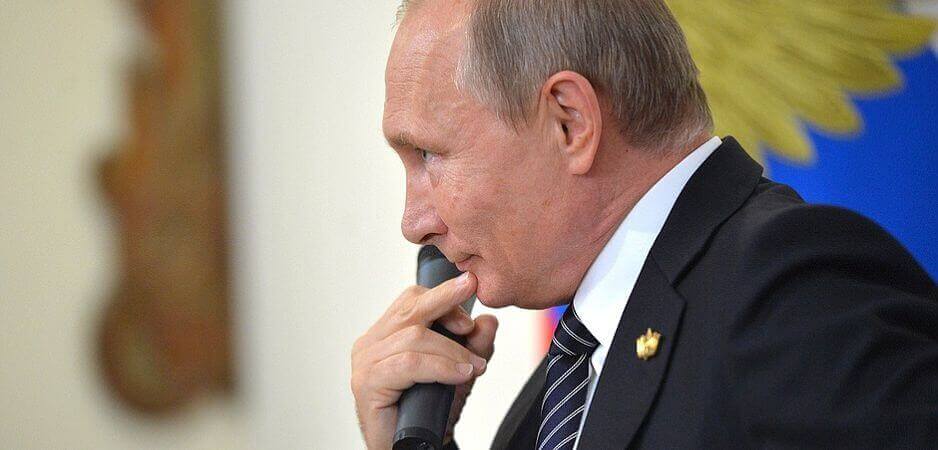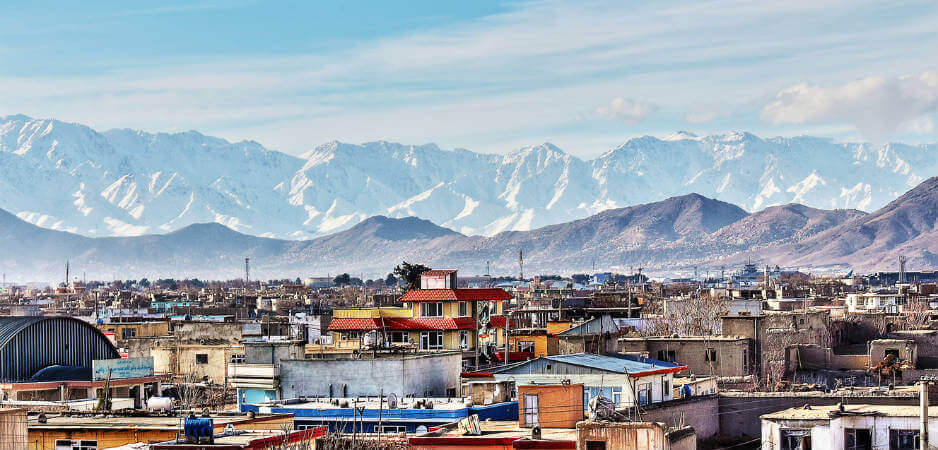Strikes on Syria after a ghastly chemical weapons attack boost Trump’s popularity but raise questions of whether they are punitive, preventive or just.
In an age where there are five jobs in public relations in the US for every single job in journalism, there are far too many issues for journalists to cover. This week was a classic example of that fact.
In South Asia, two events were significant. The African Heads of Mission said the recent attacks on Nigerians in India were “xenophobic and racial,” denting the prestige of a country that once opposed apartheid and championed freedom of former colonies. In Pakistan, 20 men and women were beaten and hacked to death in a Sufi shrine by a self-proclaimed mystic, raising grim questions about the role of religion and the prevalence of violence in the country.
Russia experienced violence too. An explosion in a St Petersburg metro train killed 11 people and wounded dozens more. Thankfully, another bomb did not go off. It was found and defused by Russian security forces. A day later, it emerged that a suicide bomber might have set off the explosion. This bomber was reportedly born in Kyrgyzstan but had acquired Russian citizenship. If that is true, it would fit the profile of Central Asian migrant workers in Russia turning to radicalism. Apparently, racism, injustice and abuse enable Islamic extremists to indoctrinate and recruit them.
Even as violent events transpired elsewhere, US President Donald Trump and Egyptian President Abdel Fattah el-Sisi held court in Washington, DC. Trump hosted Sisi warmly, declaring that his Egyptian counterpart has been “very close to me from the first time I met him.” As per Trump, they “agree on so many things” and that he is “very much behind” Sisi. For a military dictator accused of grave human rights violations, there could not have been a warmer welcome by the purported leader of the free world.
Barely was Sisi out of the door when Chinese President Xi Jinping came knocking. Trump was “pleased to host” the president and his wife at Mar-a-Lago in Florida. The White House website claims, “The two leaders had positive and productive meetings.” They have “agreed to work in concert to expand areas of cooperation while managing differences based on mutual respect.”
This is a far cry from the days when Trump no longer wanted to allow China “to rape our country” by manipulating its currency, stealing American jobs and inflicting a terrible trade deficit on Uncle Sam. Trump did not quite entirely kiss and make up with Xi. Apparently, the two sides were candid about North Korea as well as the East and South China Seas. President Xi “also noted the importance of protecting human rights and other values deeply held by Americans” even as Trump fired missiles into Syria.
CHEMICAL WEAPONS II: AN ASSAD ENCORE
In 2013, more than 1,400 civilians, including 426 children, died in a gruesome chemical weapons attack in Syria. The US deemed that Syrian President Bashar al-Assad’s regime was responsible for this war crime. Barack Obama, the then-US president, had drawn a line in the sand against the use of chemical weapons. For four days in August, Syrian troops repeatedly flouted it. They fired rockets after rockets into densely populated neighborhoods that were soon enveloped in what Joby Warrick called an “oozing blanket of suffocating gas.”
Obama huffed and he puffed but did not do anything to the house of Assad. For many, this was Obama’s Neville Chamberlain moment. He had pontificated in a crisis, dithered instead of making a decision and failed to use his sword after taking it out of his scabbard. Assad crossed the thin red line against chemical weapons with merry impunity. This was one of the reasons that veteran diplomat Gary Grappo damned Obama for leaving “no legacy in the Middle East.”
In the face of Obama’s Hamlet-like dilemma, Russian President Vladimir Putin rode to Assad’s rescue. Putin crafted a cunning plan to get his vassal off the hook. He proposed a plan to destroy 100% of Syria’s chemical weapons. The former KGB colonel blamed the rebels for the chemical weapons attack even while admitting that his sidekick in the Middle East had such weapons. He reassured Obama that the Russians would destroy these weapons and gave the US the face saving deal to stay out of another Iraq-like quagmire in the Middle East.
It turns out that the Russians might not quite have succeeded in destroying 100% of Syria’s chemical weapons. This week, Syrian jets struck Khan Sheikhoun in the northwest Idlib province. More than 80 people, including 11 children, died. Over 550 were injured. These numbers are not terribly high by the bloody standards of Syria’s brutal civil war.
However, this attack soon attracted attention because it was obvious that chemical weapons had been used in Syria yet again. Al Jazeera reports that people were vomiting and foaming from the mouth after the attack. Many lost consciousness and suffered muscle spasms. According to experts, symptoms that include blue facial skin and lips, severe shortness of breath and asphyxiation, constricted pupils and slow heart rate indicate that the use of an organo-phosphorus compounds nerve agent, which can be found in a category of toxic gases that includes sarin.
Naturally, Assad blamed the US for fabricating the story. He blamed al-Qaeda for the use of chemical weapons. Assad questioned whether there had been an attack and whether children had even died. After all, there are lots of fake videos around. Information is also a casualty in the fog of war.
Russia was more imaginative. It claimed that chemical weapons might have been in “a large terrorist ammunition depot” and the airstrikes might have released them. Hamish de Bretton-Gordon, a former commanding officer of the British Armed Forces Joint Chemical Biological Radiological Nuclear Regiment, told the BBC that Russia’s narrative was “pretty fanciful.”
 As per this British officer, “if you blow up sarin, you destroy it.” Besides, sarin and other nerve agents are almost invariably stocked in a “binary manner.” This means that two distinct chemical precursors are kept separately and combined just before use, either manually or automatically inside a weapon when it is launched. Therefore, Russia’s narrative seems even less credible than Syria’s.
As per this British officer, “if you blow up sarin, you destroy it.” Besides, sarin and other nerve agents are almost invariably stocked in a “binary manner.” This means that two distinct chemical precursors are kept separately and combined just before use, either manually or automatically inside a weapon when it is launched. Therefore, Russia’s narrative seems even less credible than Syria’s.
ENTER SUPERHERO TRUMP
Those despairing of the imbroglio in Syria, Iraq and the rest of the Middle East can now breathe a sigh of relief. Unlike effeminate and indecisive Obama, macho and bold Trump is not going to brook any more nonsense from Assad or even Putin.
Almost immediately after the chemical weapons attack, two US Navy ships in the Mediterranean Sea fired 59 Tomahawk cruise missiles at the Shayrat airfield in the western Homs province of Syria. As per the Pentagon, they “targeted aircraft, hardened aircraft shelters, petroleum and logistical storage, ammunition supply bunkers, air defense systems, and radars.”
As usual, Americans tried to be terribly humane. The US “took extraordinary measures to avoid civilian casualties.” It even took “every precaution” to “execute this strike with minimal risk to personnel at the airfield.” Yet such is Americano prowess that Uncle Sam “severely damaged or destroyed Syrian aircraft,” support infrastructure and other equipment, reducing Assad’s ability to deliver chemical weapons. If we are to believe the Pentagon, this “strike was a proportional response to Assad’s heinous act.”
The Telegraph, the United Kingdom’s iconic right-leaning newspaper, reported that Syrian planes took off from Shayrat the very next day to carry out bombing raids in “a defiant show of strength.” Clearly, American strikes were not quite as spectacularly successful in military terms as the Pentagon claims.
Besides, the Russians have now vowed to bolster Assad’s defenses against American attacks. They have diverted a warship to the Mediterranean to protect the Syrian coastline. Russian Prime Minister Dmitry Medvedev has thundered that the attacks have fatally undermined Moscow’s initial trust in the new US administration and brought the countries to the “the verge of a military clash.” Attacking Syria again might not be as easy next time, calling into question the efficacy of the American strike.
The attack might not have been effective or successful in military terms, but it was certainly a political success. Trump’s popularity certainly went up both abroad and at home. The BBC reports that Arabs on social media showered Trump with thanks and praise. Even women who graduated from Yale and ardently supported Hillary Clinton approved of the strike. They argued that, in this day and age, the world cannot allow people to use chemical weapons and get away with it.
VENGEANCE IS MINE
Clinton’s supporters have a point. The idea of justice as just desserts is an age-old one. There is virtue and there is sin. Punishment is one’s due for sin. Even after death, hell awaits. Why must Assad get away with murder?
As Trump said, “Even beautiful babies were cruelly murdered in this very barbaric attack. No child of God should ever suffer such horror.” Therefore, the president acted to enforce justice. This justice was intended to be both punitive and preventive. Trump punished Assad for his transgressions and deterred future ones. At least that was the idea.
Justice is an appealing idea but it is messy. It involves power. Someone has to write the rules of the game, judge when they have been transgressed and then mete out punishment. In a village or a tribe, this happens quite organically. In democracies, the legislature, judiciary and executive combine to create a justice system. Internationally, things get muddy and messy.
Power corrupts. So does wealth. Clinton’s Yale-educated supporter was unaware that Uncle Sam had used “liquid fire” napalm or sprayed villages with Agent Orange during the Vietnam War. The US government now admits that even children of veterans may suffer birth defects because of Agent Orange. This agent remains toxic for decades and is still ravaging the Vietnamese. It continues to poison the land and the people of Vietnam, causing birth defects, cancer and other illnesses.
There has been no justice for the Vietnamese. No one in the US has been tried for the use of such weapons, leave aside been punished. The US has shelled out a pittance in aid and compensation that would put even Uncle Scrooge to shame. Uncle Sam has not even bothered to say sorry. After all, it was fighting for good capitalism and against evil capitalism. And as the old saying goes, all is fair in love and war.
As per this logic, the US was quite right in doing what it did to the yellow-livered, yellow-bellied, small-eyed, flat-nosed untermensch ignorantly embracing communism. It was in keeping with what their white forefathers did to Native Americans and what Spanish conquistadores did south of the Rio Grande. Assad might justify his actions similarly.
The truth is that the world is messy and the Syrian Civil War infernally complicated. Hamlet’s over intellectualizing and paralysis of hesitation would not be the best course of action, but the lack of thought and impetuousness of Laertes is not ideal either. Bringing people to justice is straightforward only in Hollywood cowboy westerns. In conflicts like Syria or Vietnam, justice like truth is rarely clear and never simple. Besides, did some pretty important fellow not once say, “vengeance is mine”?
*[You can receive “The World This Week” directly in your inbox by subscribing to our mailing list. Simply visit Fair Observer and enter your email address in the space provided. Meanwhile, please find below five of our finest articles for the week.]
The Kremlin Strikes Back
If the Kremlin makes counterterrorism its cause in the upcoming election, the people may well rally—just not around the flag.
In the two weeks since anti-corruption protests broke out across Russia, the Kremlin has made clear that it intends to fight back. Youth, the vanguard of the March 26 demonstrations, and social media, on which demonstrators organized themselves despite a media blackout, have come under severe government pressure, which is likely to intensify as the state enacts new counterterrorism measures following the tragic events of April 3. Indeed, the government’s response to the attack in Saint Petersburg offers some insight into its plan for suppressing Russia’s reinvigorated opposition as the 2018 presidential election nears, a plan that is far from perfect.
The Kremlin has reason to be concerned. Since March 26, the electability of anti-corruption crusader Alexei Navalny has risen, with Levada Center finding every 10th Russian voter at least willing, if not determined, to vote for… Read more
Toward a New World Order in Eurasia
Amid US airstrikes on Syria, the future of Eurasia is up for grabs.
One thing this week’s US airstrikes in Syria highlight is the fact that the sands are continuously shifting as regional and world powers jockey for position in a future Eurasian world order. The strikes raise questions that go far beyond potential greater US involvement in the Syrian conflict. The answer to those questions will likely impact the role America may play in Eurasia and the Asia Pacific.
What is surprising is not the fact that US President Donald Trump ordered the launching of missiles. He has signaled with his appointment of generals in key national security positions as well as his budget proposals a more muscular, military-oriented approach to foreign policy. What that meant has been evident since he came to office in January in greater US military engagement in Yemen. What is surprising is that days after Trump declared that he was president of… Read more
Suu Kyi Continues Denial of Rohingya Abuses
Aung San Suu Kyi continued a pattern of denial and unwillingness to criticize the Myanmar military over crimes against the Rohingya.
In a rare interview with an international news network, Myanmar’s leader Aung San Suu Kyi downplayed atrocities committed against the Rohingya people in the country’s Rakhine State and dismissed growing international criticisms of her response to the abuses. In the interview given to the BBC, Suu Kyi ardently denies charges that Myanmar’s military is engaged in ethnic cleansing. Suu Kyi preferred instead to frame the situation as a matter between “people on different sides of a divide” and insisted that those who have been displaced by violence are welcome to return.
Lost between this denial of atrocities and dubious invitation to return to safe conditions are serious human rights abuses by military and security forces, which prompted the United Nations Human Rights Council last month to establish an independent, international fact-finding mission—a mission with which Suu… Read more
American Public Policy: Void of Humanity
A nation that allows its public policy debate to be driven by a distorted “concern” for humanity from those who have demonstrated no interest in humanity is a nation that cannot lead anyone anywhere.
Maybe it is time for a Humanity Index for America, a way to measure the humanity of this nation’s public policy initiatives. The index should be free of political bias, ideology and the rancor presently undermining the capacity of our public institutions to confront critical national and international issues.
Since I am going to be the arbiter of the index, I need to start by saying that I have lived a privileged life—born relatively smart, white, in America, to parents who provided for me and loved me. Add to my lucky start a good public school education, college and law school, and fairly good health. To this, I can add family and friends that provide love and support. So, why do I care… Read more
Coming Together to Rebuild Afghanistan
Afghanistan’s diaspora around the world needs to take an active role to maintain the positive changes currently taking place.
It is winter in Afghanistan. The snow covers in white the glorious peaks of the country’s mountains and plains, but the smoke from wooden stoves pushes up, joining the clouds that are limiting the beauty of the view. To Afghans, their future is subjected to the same obstructions—a feeling that better and brighter days are coming is there, but daily struggles make them too difficult to truly envision.
An existence guided by peace, stability and prosperity has always been a hope for Afghans, but it is only lately that the idea has acquired a concrete foundation. The positioning and engagement of youth in government, the notable reduction in corruption, a significant increase in the number of children attending school, the fall of maternal mortality rate and the steady but constant economic growth have certainly contributed to vivifying this… Read more
The views expressed in this article are the author’s own and do not necessarily reflect Fair Observer’s editorial policy.
Photo Credit: Chiyongxin
Support Fair Observer
We rely on your support for our independence, diversity and quality.
For more than 10 years, Fair Observer has been free, fair and independent. No billionaire owns us, no advertisers control us. We are a reader-supported nonprofit. Unlike many other publications, we keep our content free for readers regardless of where they live or whether they can afford to pay. We have no paywalls and no ads.
In the post-truth era of fake news, echo chambers and filter bubbles, we publish a plurality of perspectives from around the world. Anyone can publish with us, but everyone goes through a rigorous editorial process. So, you get fact-checked, well-reasoned content instead of noise.
We publish 2,500+ voices from 90+ countries. We also conduct education and training programs
on subjects ranging from digital media and journalism to writing and critical thinking. This
doesn’t come cheap. Servers, editors, trainers and web developers cost
money.
Please consider supporting us on a regular basis as a recurring donor or a
sustaining member.
Will you support FO’s journalism?
We rely on your support for our independence, diversity and quality.











